 полная версия
полная версияHarper's Young People, December 9, 1879
For many hours of the ensuing night he worked with might and main to carry the fierce invaders across the ferry. When they had all disappeared on the opposite bank, Osmund returned to his trembling wife and child, and brought them safely back to his cottage. In commemoration, it is said, of this event, the fair daughter of Osmund gave the great island fern her father's name. Those who care not to accept this fanciful origin of the name Osmunda, will perhaps incline to another suggestion which has been made, that the generic name had been derived from an old Saxon word signifying strength, the specific name indicating its royal or stately habit of growth.
TRAVELLING BAG FOR PETS
Little girls who like to carry their pets with them on a journey will be glad to know how to make this pretty and convenient bag, by means of which Fido and Mutt can travel like princes. The bag is made of black leather, and is closed on the side with a lock and key and clamps. The pocket for holding the dog is fifteen inches wide and nine inches and a half high. The front is cut out, leaving a margin on the edges an inch and a half wide, and the opening is filled with a wire screen, through which the little prisoner can see and breathe freely. For protection, the screen is covered by two leather flaps, fastened one at the bottom and one at the top of the bag, which overlap each other, and are secured by steel clasps.
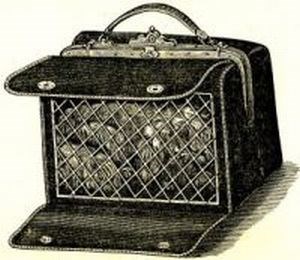
TRAVELLING BAG FOR PETS.
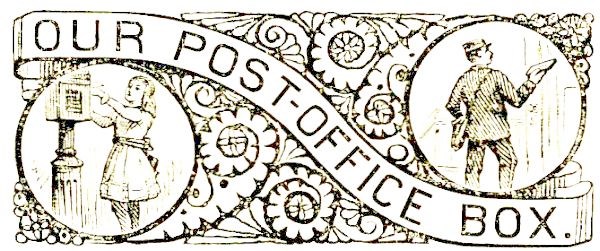
We do not print all letters received, as some are too long, and others simply ask a question, to which we give an answer. Here is a pretty letter which needs no comments:
I am a little boy eleven years old, and have been living in South Carolina, but last summer I got hurt while playing with the boys, and have been sick ever since. I have not walked for five months. My parents have brought me to Salem, Massachusetts, where I could have good doctor's care. My cousin, who lives in New York, very kindly sends me Harper's Young People, and I want to tell you how much I enjoy it. I am very lonely lying still all the time, but the boys come to see me, and one of them has two rabbits for me when I am able to take care of them. I wish all the little boys and girls could have your paper, it is so nice.
Horace F. Hutchinson."Fred," of Montclair, New Jersey, writes:
I have a handsome yellow cat named Goldy. My cousins Howard and Charlie have a cat named Blacky, and a dog named Jack. Papa reads us Harper's Young People every Sunday, and I like it very much.
Here are some very pleasant words from J. E. Woodbridge, Duluth, Minnesota:
I wish to tell you how I like your paper. I do really like it. I wish you would put boys' pieces in the paper for speaking in school. I live in Duluth, on the shore of a very big lake—the biggest in the world, I think. I am seven years old. I have a little yellow dog, and he grins when he is pleased.
James Long.—The examinations for admission to the school-ship St. Mary's are easily passed by any school-boy of moderate ability, but it is indispensable that the applicant be physically sound, and of good moral character. Neither money nor influence is needed to gain admission, and the expense on entering is confined to the cost of outfit and uniform. You can make fuller inquiries of David R. Wetmore, Esq., chairman of the Committee on Nautical School, of the New York City Board of Education, or on board the St. Mary's, which is now in winter-quarters at the foot of East Twenty-third Street, New York city.
C. D. F.—The measurement of glasses for "Boy's Telescope" refers to the focus, not to the size of glass. Any reliable optician will supply you with the lenses.
Agnes P.—Your answers to puzzles are correct. We do not know the address of Lulu W., but will print it if she will send it to us.
"Louise," Dubuque.—Your account of Sir Rowland Hill is correct, and very neatly written, but as it is almost the same as those we have already printed, we do not give it.
"Max."—Your numerical charade is very good, but contains too many repetitions of the same letter to be perfect; therefore we do not print it.
Answers sent by R. Dunlop Foster, Chicago, to mathematical puzzles are correct, with the exception of No. 2, which is not carried back to the original amount possessed by the poor old man when the water-spirit made his first offer.
M. A. C., Rochester, writes: I have commenced taking your little paper, and I write now to tell you that I am delighted with it. I read it to my brothers and sisters, who are very much interested in the story of "The Brave Swiss Boy."
J. E. B., another bright little girl, gives us a scolding, which we hope she will retract before long.
H. A. T.—We can not give any puzzles not accompanied by full name and address of the sender, as well as the answers.
The following communication from a youthful reader in Washington, D. C., will be of interest to young bicyclists in other cities:
Here in the City of Magnificent Distances, where many of the streets are 100 feet wide and the avenues 160, the speed of the bicycle surpasses even that of the horse.
Many of the streets are "concrete," and a run over them is sure to be attended with boundless pleasure, and often a race.
There are about thirty bicyclists in the city, twenty of whom have formed a club. To see them, with their blue caps and leather leggings, six abreast, coming down the Avenue with their arms folded, causes many an equestrian to spur up his horse in vain.
Through the surrounding villages it is a common occurrence to see eight or ten bicyclists pass, especially on public holidays.
Many riders have a small bell attached to the handle, which is rung as an alarm to pedestrians, for the approach of the bicycle is as devoid of noise as that of the tiger. In the evening a lantern also is hung on the axle of the driving-wheel between the spokes, and the noiseless and rapid approach of such a red light might suggest to a stranger thoughts of the infernal regions.
In conclusion, I will say that bicycling is the most exhilarating and invigorating pastime for boys ever yet discovered.
N. L. C.THE CAT SHOW
A THANKSGIVING EPISODE
By MRS. W. J. HAYS,Author of "The Princess Idleways.""Yes, next month comes that old, everlasting Thanksgiving-day. I wonder why we have to spend more than half of it at the dinner table!"
"Suppose we don't? Let us strike out on a new lead."
"What can we do? Grandmother's pumpkin pies must be eaten, and grandfather's great turkey must be carved."
"Well, Charlie, I like originality."
"What is that, Sue?—anything in the candy shop?"
"You dreadful boy! You are just too—"
"Sweet for anything," put in Charlie.
Sue jumped up and tried to box his ears; but she chased him out into the hall, and tripped over the mats, and away he went up the stairs, and stood laughing at her as she gathered up her worsted-work.
"If I were a gentleman," said Sue, in her haughtiest manner, "I would assist my friends when misfortune overtook them."
"Hear! hear!" cried Charlie.
"I had the nicest little plan to propose," she went on.
"What was it, Sue?" said Charlie, whose curiosity was aroused.
"Not a word more to one so ungallant, so very rude."
"Ah, Sue dear," coaxed Charlie, coming down and putting his arm around her, "you are the nicest little sister in the world, if you did want to box my ears. Now tell us the plan, that's a darling."
"Well, it isn't much, after all; it is only that I want to make Thanksgiving a little more of a reality, and I thought—now, Charlie, don't laugh at me—that if we could do something for somebody, which would make him thankful, wouldn't it be nicer."
"And who did you think of?"
"I thought of old black Betsey and her husband, they both are so old and so poor. Suppose we give them a dinner?"
"All by ourselves? Where would we get the money?"
"We will have an exhibition of cats. I will borrow Aunt May's old tabby, and John's big Tom, and Lulie Bell's five white kittens, and we have our own, and you can get others, and we will rig up a room in the barn, and put placards up, and I will tie bright ribbons on all their necks, and we'll charge ten cents for grown people and five cents for children, and—oh, I don't know what else."
"Splendid!"
The idea suited Charlie, and no time must be lost. Every day was valuable. Mother was consulted, and had no objections. Father gave permission to use the harness-room. The cats were borrowed: big cats and little cats, sleepy old pussies and lively young kits, gray cats, white cats, and "cherry-colored cats," as the placard read. "For one day only," was also on the placard. Charlie was door-keeper, and a busy time had Sue in keeping peace among the pussies. They screamed and scratched, and kept up a perfect Pinafore chorus, until the child wished she was deaf, or could give them all opium; but the day wore on, and all the children of their acquaintance enjoyed the sport, and not a few of the elders looked in upon them. By evening Charlie was rejoicing in the possession of a full money-box, but his face grew long as he counted the pennies. In reply to Sue's eager query of "How much?"
"Only two dollars and a half," was his dejected reply.
"Well, we can buy lots of things with that," said Sue, whose knowledge of marketing was limited.
"I am afraid it will take all for the turkey."
"Then we'll get chickens," said Sue.
"And how about cranberry jelly?"
"Mother will give us apples from her barrel."
"And celery, and sweet-potatoes, and all the other goodies?"
"We must make it all do. I will go to Mr. Scott, the grocer, and tell him we want everything at the very lowest price."
"Well, I leave it all to you," said Charlie, with masculine disdain of details, and scorn for so small a sum.
"That is right. You'll see how I will manage," said Sue, confidently.
And manage she did.
Thanksgiving was a cold, bleak day, and old black Betsey had no idea of leaving her fireside for church.
"I can give my tanks jist as well one place as anodder," said she, in reply to a sweet coaxing voice which was urging her to go out.
"Now please just go to oblige me, Aunt Betsey," said Sue; "Charlie and I want you and Uncle Jake to go to church for a very particular reason. You can not refuse me, I am sure."
The old woman grumbled and scolded and shuffled about in a discontented way, but the pleading little Sue stood firm, and gave an exulting shout as she finally closed the door upon both of them.
"Hurrah!" exclaimed Charlie, and then they both went to work.
The poor little cabin had to be swept and dusted, and all the cracked crockery well wiped, but Sue had tied on a great big apron, and Charlie pinned on a huge towel, and declared himself head waiter. Then the market-basket, carefully concealed in the wood-shed, had to be unpacked, and Sue's mother had given a bright red table-cover, and all sorts of nice little things to fill up corners; and when at last everything was set out, and green boughs hung over the doors, and the ready-cooked turkey was fizzing over again in the oven, and the dinner was ready, Sue and Charlie hid themselves behind a door and waited for Aunt Betsey and Uncle Jake. Slowly the old people came grumbling home as they had grumbled out. They were old and stiff and poor, and what was there to be thankful for? For the rheumatism? Yes, if God willed it, said Aunt Betsey, who, however, was far from cheerful.
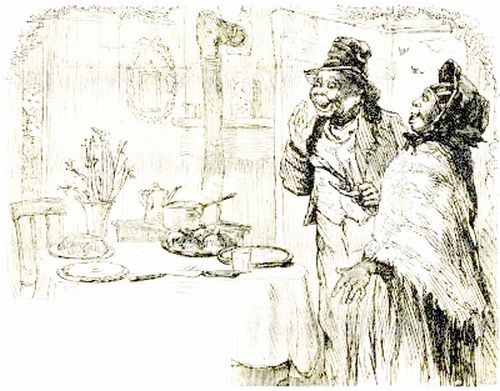
"WHAT DOSE CHILLEN BIN ABOUT?"
They pushed open the door, and the savory smell of cooking saluted them.
"Hi, Uncle Jake, what you tink o' dis? what's de meanin' of all dis yer?" said Aunt Betsey.
Uncle Jake's mouth opened wide, as if the better to inhale the rich odors.
"Who's bin hiyar? What dose chillen bin about? Good gracious me! if dis ain't a dinner fit fur a king."
Uncle Jake's grin burst into a laugh.
"Oh my! dey meant we should hab a Tanksgivin' in yearnest;" and the two old souls shook their sides with laughter.
"De good Lord bress dose chillen, an' give 'em as tankful hearts as we hab dis day!" said Aunt Betsey.
Sue and Charlie had meant to give a glorious war-whoop and shout, but their voices would not come, and when they looked at each other the tears came welling up from their tender little hearts.
"Come, Sue," said Charlie, "let us get away without their seeing us. Who ever thought a cat show would make two people so glad!"
They went home to their own dinner with a new idea of Thanksgiving-day; it seemed a better and a fresher feast; and after the day was done and the stars came out twinkling their thanks, and the children, tired with play and glad to rest, laid down their sleepy heads on their pillows, their angels whispered softly dreams of peace and joy.
The Hottest Spot on Earth.—One of the hottest regions on earth is along the Persian Gulf, where little or no rain falls. At Bahrein the arid shore has no fresh water, yet a comparatively numerous population contrive to live there, thanks to the copious springs which break forth from the bottom of the sea. The fresh water is got by diving. The diver, sitting in his boat, winds a great goat-skin bag around his left arm, the hand grasping its mouth; then takes in his right hand a heavy stone, to which is attached a strong line, and thus equipped he plunges in, and quickly reaches the bottom. Instantly opening the bag over the strong jet of fresh water, he springs up the ascending current, at the same time closing the bag, and is helped aboard. The stone is then hauled up, and the diver, after taking a breath, plunges again. The source of the copious submarine springs is thought to be in the green hills of Osman, some 500 or 600 miles distant.
Acres of Perfume.—Some idea of the magnitude of the business of raising sweet-scented flowers for their perfume may be gathered from the fact that Europe and British India alone consume about 150,000 gallons of handkerchief perfume yearly. There is one great perfume distillery at Cannes, in France, which uses yearly about 100,000 pounds of acacia flowers, 140,000 pounds of rare flower leaves, 32,000 pounds of jasmine blossoms, and 20,000 pounds of tuberose blossoms, together with an immense quantity of other material used for perfume. Victoria, in New South Wales, is a noted place for the production of perfume-yielding plants, because such plants as the mignonette, sweet verbena, jasmine, rose, lavender, acacia, heliotrope, rosemary, wallflower, laurel, orange, and the sweet-scented geraniums grow there in greater perfection than in any other part of the world. South Australia, it is believed, would also be a good place for the growing of perfume-producing plants, though at present not much cultivated.
BLIND PIGS
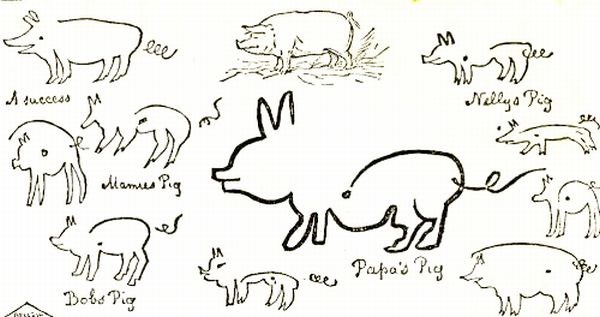
PIGS DRAWN WITH YOUR EYES SHUT.
The other evening, seated around the table as usual, we had a hearty laugh over a new idea that Bob had learned from one of his school-mates.
"Now you all take a pencil and piece of paper," he directed, "and try to draw a pig with your eyes shut."
"I can't draw a pig with my eyes open," said Mamie.
"That's just the reason," said Bob. "Now look here: begin at the ears, then draw the nose, and go on drawing the legs and the back, and when you think you've got round to the ears again, put in the eye, and then the tail; but you must keep your eyes shut tight."
So we each tried a pig, and—well, I would never eat roast pork or fried ham again if I thought real pigs were shaped like ours.
Just try making one some dull evening, and see if you do not have a good laugh, that is all.
Face-Painting.—Chinese men do not paint their faces, either on the stage or elsewhere, but in Japan actors in certain plays are painted on the face with bright streaks of red paint, put on usually on each side of the eyes. The kind of painting is exactly that of savages. It is a curious fact that this form of painting, surviving in adults on the stage, is still used elsewhere for the decoration of young children. It is quite common to see children on festive occasions, when elaborately dressed by their parents, further adorned with one or two transverse narrow streaks of bright red paint, leading outward from the outer corner of their eyes, or placed near that position. Such a form of painting possibly existed in ancient times in China—perhaps to distinguish fighting men.
ANSWERS TO MATHEMATICAL PUZZLES IN NUMBER 2
No. 1.—The first man had 7 sheep; the second man had 5 sheep.
No. 2.—The old man had 21 cents when the water-spirit first appeared to him.
No. 3.—The grocer had 31 eggs; the first woman bought 16, the second woman bought 8, the third 4, and the fourth 2.
No. 4.—Each son received $7000.
ANSWER TO NUMERICAL CHARADE IN NUMBER 2
Cetewayo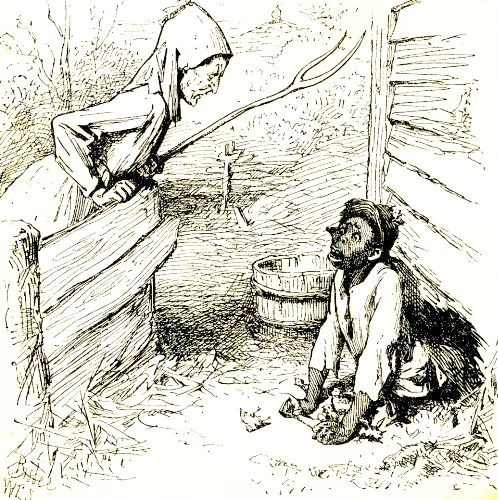
"HI! MISTISS, IS DESE YOURN?"
Harper's Young People
Harper's Young People will be issued every Tuesday, and may be had at the following rates:
Four cents a number.
Single subscriptions for one year, $1.50; five subscriptions, one year, $7.00: payable in advance. Postage free.
Subscriptions may begin with any number. When no time is specified, it will be understood that the subscriber desires to commence with the number issued after the receipt of order.
Remittances should be made by Post-office Money Order, or Draft, to avoid risk of loss.
Published by HARPER & BROTHERS, New York.
A LIBERAL OFFER FOR 1880 ONLY
☞ Harper's Young People and Harper's Weekly will be sent to any address for one year, commencing with the first number of Harper's Weekly for January, 1880, on receipt of $5.00 for the two Periodicals.









